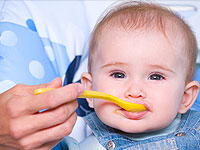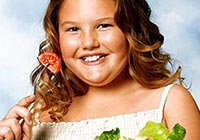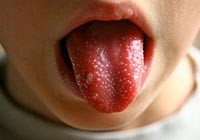Allergy in a child can develop within a few minutes after entering the gastrointestinal tract. What provokes allergies to products in children? How to react to parents on the hypersensitivity of the body of the younger generation? These questions rise in the article.
Content
 An allergy in a child should be considered as an increased sensitivity of the body to such environmental factors, as chemicals, microbes and their toxins, and of course food that ensures the vital activity of each living being.
An allergy in a child should be considered as an increased sensitivity of the body to such environmental factors, as chemicals, microbes and their toxins, and of course food that ensures the vital activity of each living being.
Food allergies today are widely distributed and a steady tendency to its growth is noted. Many foods can be represented as food allergens, but are especially widely known: meat, milk, fish, eggs, as well as citrus, tomatoes, chocolate, strawberries. A few minutes after reception, they can cause sudden vomiting or diarrhea, although sometimes symptoms of hypersensitivity can join some time later.
In a differential diagnosis, exogenous allergens of the following groups should be allocated:
- biological — microbes, viruses, fungi;
- Medicinal — Pharmacological preparations;
- Household — home dust, insects or their particles, household chemicals;
- pollen some flowering plants;
- Food allergens;
- Industrial allergens.
In case of allergen, a specific or non-specific reaction is developed. Timely removal of the source of allergies ensures the absence of painful manifestations and will not require a special diet when allergic in a child. Re-penetration of allergen and the impact on the organism sensitized to it causes the occurrence of diseases. Increased sensitivity in this case — Specified and enhanced in response to contact with a previously familiar allergen. Non-specific reactions are developing at the first meeting with an allergen without a period of sensitization, for example, the acute intolerance to products and drugs. The development of the immediate and slow reaction is noted. Immediate type manifests itself after 15-20 minutes of skin and respiratory symptoms. This can include anaphylactic shock, pollinosis, urticaria, bronchial asthma, swelling of quinqu, serum disease. Slow-type reactions are usually developing in a few days.
Today, practitioners and scientists with confidence declare that allergies are not formed in all cases, heredity plays a certain role, as well as the state of the nervous and endocrine system. According to medical statistics, about 70% of children suffer from hereditary allergies, if parents have such diseases as Pollos, anaphylactic shock, bronchial asthma. The predisposition to these diseases in one parent line increases the likelihood of allergies to 55% of cases, and not the diseases themselves are more often inherited, but the tendency to them.
The diagnosis of allergies is carried out using various samples and laboratory studies and is distinguished by special care and details due to the fact that a specialist allergist and an endocrinologist need to find out what is a reason for the occurrence of such a state of the body, and what measures should be taken to avoid reaction repeat.
Treatment implies immediate termination of the contact of the patient with an allergen and is aimed at reducing the sensitivity of the body to a certain factor. This desensitization method is based on the formation of blocking antibodies in response to the gradual administration of allergen in increasing doses. The tasks of the doctor include not only treatment, but also educational work to assist and conduct preventive measures.
Diet with allergies in a child: reliable prevention
 Such techniques are the organization of food and normalization of the functioning of the digestive system. For babies, the main protective agent is breastfeeding, and older children are shown a diet that can provide a healthy full-fledged life. The recommendations of the Allergist and the nutritionist suggest:
Such techniques are the organization of food and normalization of the functioning of the digestive system. For babies, the main protective agent is breastfeeding, and older children are shown a diet that can provide a healthy full-fledged life. The recommendations of the Allergist and the nutritionist suggest:
- dairy products;
- lean meat;
- All kinds of cabbage and zucchini;
- Pumpkin and parsley greens;
- White and green apples;
- refined vegetable oil;
- Grain Bread and Dry Cookies.
There is a whole list of products to be exceeded in the presence of allergic reactions: smoked, spices, mushrooms, nuts, citrus, carbonated drinks.









